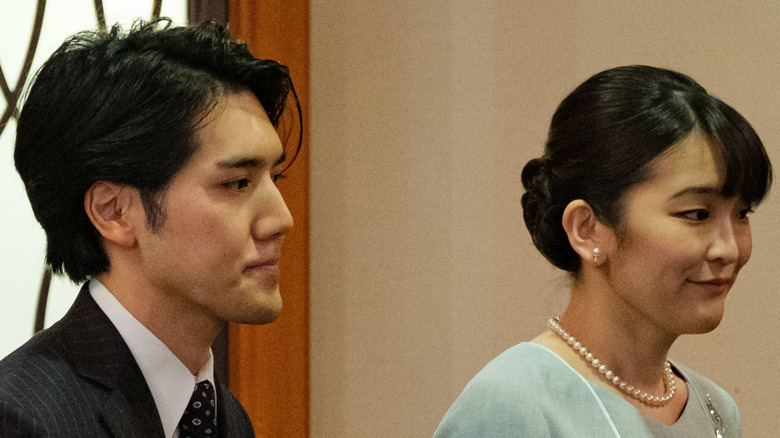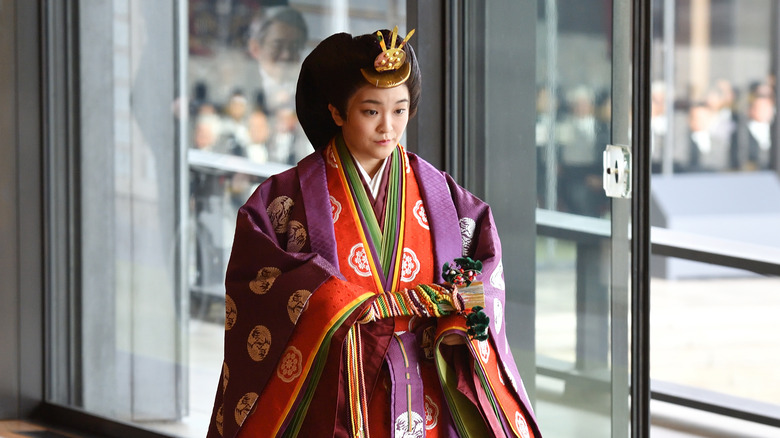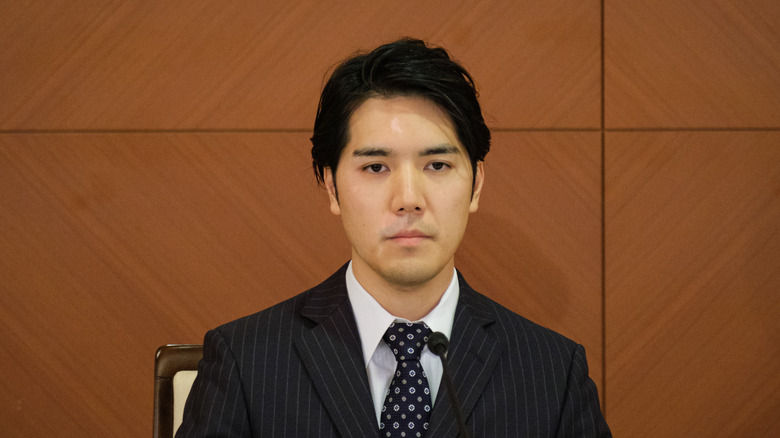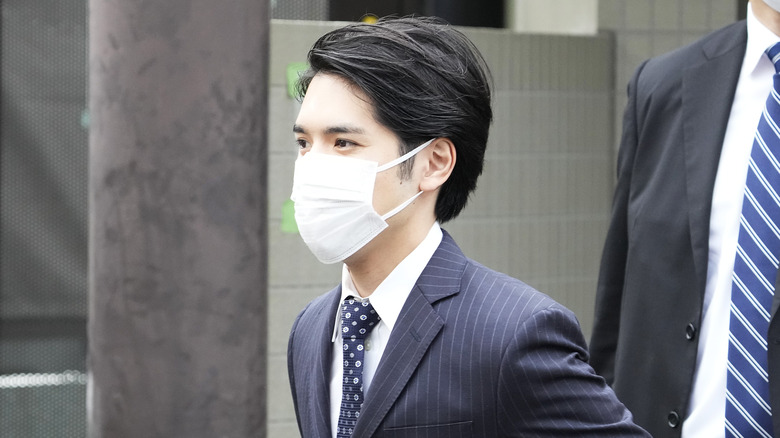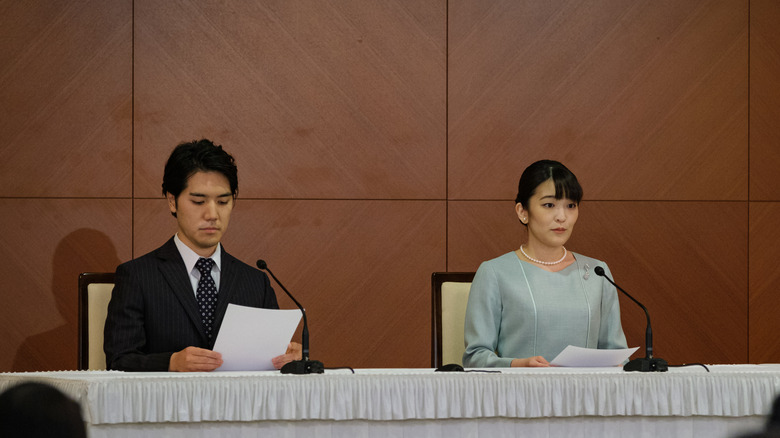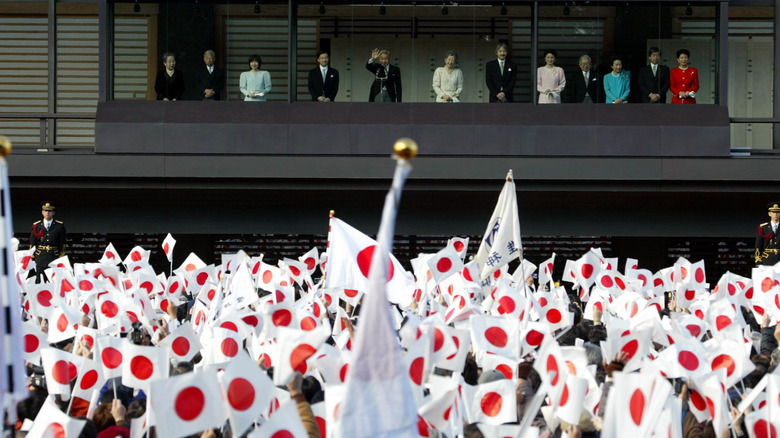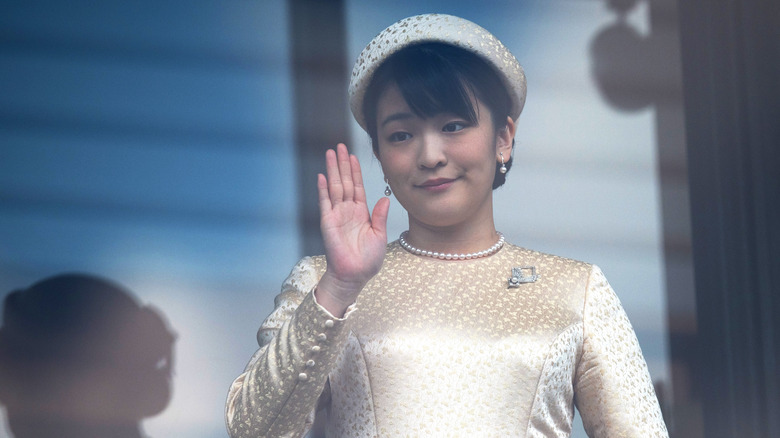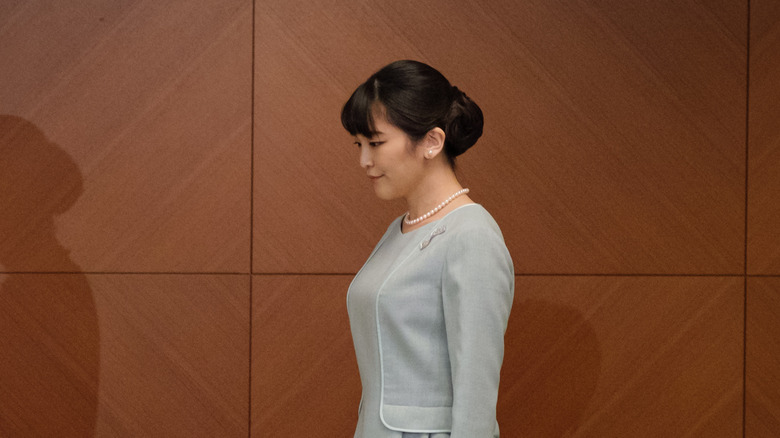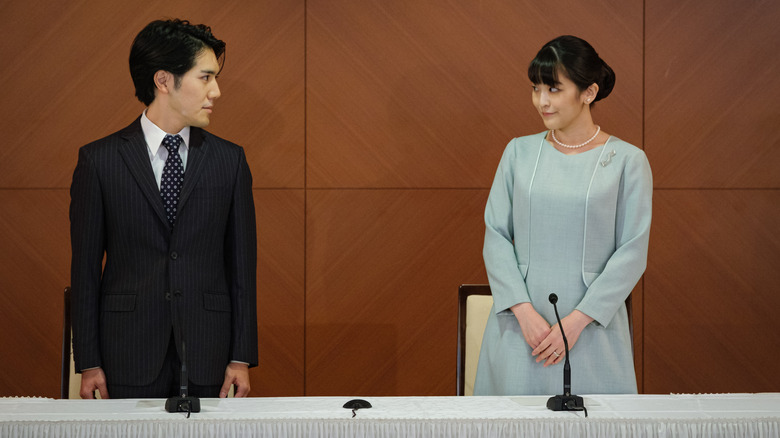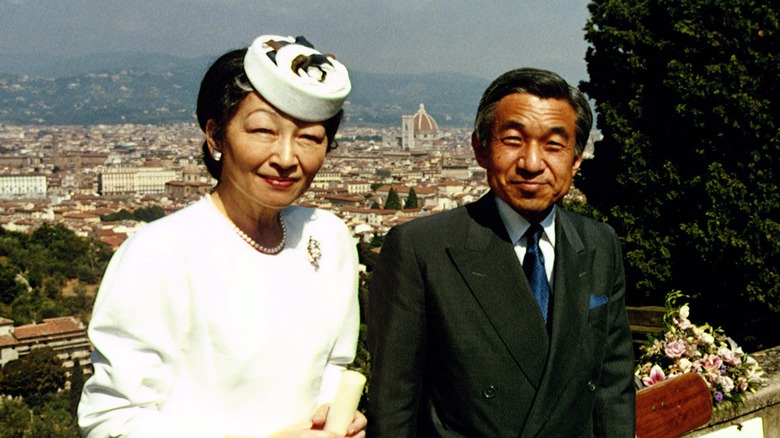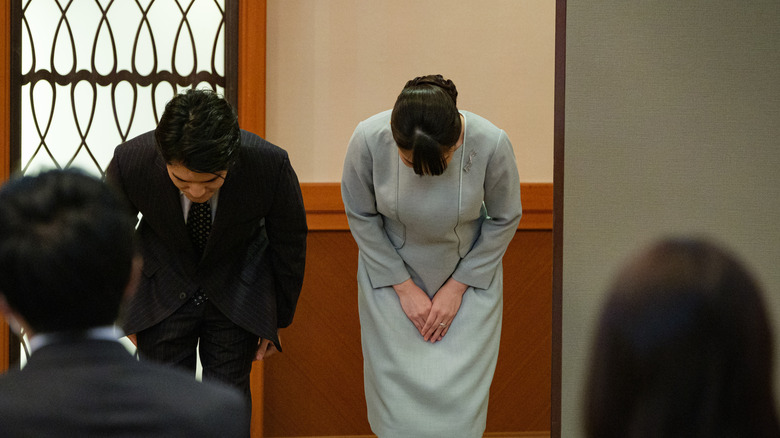The Truth About Princess Mako's Marriage To A Commoner
The media coverage of Princess Mako and Kei Komuro's relationship and their impending departure from Japan to the United States has elicited many comparisons with Prince Harry and Meghan Markle's departure from the British royal family. Mako and Kei don't have "any particular thoughts about the comparison," (via Kyodo News) and while it seems unlikely that they'll remain in the public eye quite like Meghan and Harry have, the way that the two royal couples were treated by the media bears some resemblance.
Tabloids have repeatedly called Kei a gold-digger and wouldn't let anything go after a story of a financial controversy was spread. At one point, even a particular hairstyle led to a wave of disapproving comments on Twitter. Meanwhile, the public scrutiny took their toll on Mako. But this is not the only Japanese royal couple in history to desire a life in the United States outside of the public eye. When Princess Takako Shimazu lived in Washington, D.C. for two years in the 1960s, she said "I'm happier than when I lived in Japan." (via the New York Times).
Despite everything, Mako and Kei were determined to get married and despite delays, they finally tied the knot in October 2021. But although most weddings involve families getting bigger, with Mako and Kei's marriage the Japanese royal family actually grew a little bit smaller. This is the truth about Princess Mako's marriage to a commoner.
Who is Princess Mako?
Mako Komuro, formerly known as Princess Mako of Akishino or Mako Naishinnō, was born on October 23, 1991 to Princess Kiko and Prince Fumihito, who is the younger brother of Japan's Emperor Naruhito. Her name is written with the kanji character "ma," meaning true or natural. According to the Japan Times, Mako's father "hoped she would lead an unpretentious life by staying faithful to herself."
The BBC reports that Mako attended the Gakushuin school through high school, which is where members of the Japanese imperial family typically study. But in April 2010, Mako became the first member of the royal family not to enrol for university at Gakushuin. Instead, Mako enrolled at International Christian University in Tokyo.
After finishing university in Tokyo, in January 2016, Mako received a master's degree in art museum and gallery studies from the University of Leicester in the UK. Later that year, she went on to start a PhD program at the International Christian University's Graduate School of Arts and Sciences. She has also worked in a museum in Tokyo for several years, as per the New York Times.
When she wasn't dedicated to her studies, Mako focused on fostering international relations and visited numerous countries as a result, including Honduras, El Salvador, and Bhutan. According to Kyodo News, in October 2021, Mako was awarded medals by the governments of both Paraguay and Brazil "for her work in promoting friendly ties between the two nations and Japan."
Who is Kei Komuro?
Kei Komuro was born on October 5, 1991 and was raised primarily by his mother, Kayo, after Kei's father died while Kei was in elementary school, as reported by DW. According to Kyodo News, Kei and Princess Mako first met in 2012 during a meeting for students interested in studying abroad while they were both attending the International Christian University in Tokyo.
While he was at university, Kei was appointed "Prince of the Sea" and led a tourism campaign for the town of Fujisawa, per Newsweek. In 2018, Kei went to Fordham University in New York to study law after majoring in business law at Hitotsubashi University's Graduate School of International Corporate Strategy. In 2021, Kei returned to Japan after graduating and starting work at Lowenstein Sandler, a Manhattan law firm. The Japan Times reports that Kei took the bar exam for the first time unsuccessfully in July 2021 and will likely take it a second time.
After five years of dating, Mako and Kei's engagement was announced in September 2017. According to GQ India, Kei has spoken little about himself or his engagement and instead only told reporters that he'd talk about his engagement when "the time comes." And for a while, little was said about the engagement other than the typical joyous responses.
Controversy over a financial dispute
Soon after the wedding of Princess Mako and Kei Komuro was set, a story ran in Shukan Josei magazine claiming that Kei's mother Kayo was in a financial dispute with a former fiancee, with whom she broke up with in 2012. According to DW, the story claimed that after Kei's father died, Kayo borrowed over ¥4 million ($35,000) from a former partner in order to pay for Kei's university education. And now, Kayo and the former partner were in a dispute over whether or not this money was meant to be a gift or a loan. The ex-fiance reportedly didn't ask for repayment initially, but almost a year after they'd broken up, Kayo received a letter asking for repayment. As DW puts it, "The Imperial Household Agency — consistently averse to the slightest whiff of scandal — quickly announced that the wedding had been delayed."
The Mainichi writes that a little over a year after the dispute was reported by Shukan Josei, in January 2019, Kei released a letter stating that he believed the matter to have "been resolved" and that he "will make efforts to earn the former fiance's understanding." In April 2021, Kei released an almost 30-page statement, this time indicating that he intended to pay the money "as a settlement instead of treating it as a debt and repaying it." This statement was the first time that the financial dispute was explained in detail, and Kei wrote that negotiations between Kayo and her ex-fiance "broke down."
Public and media response
Although there was initially "widespread joy" when Princess Mako and Kei Komuro revealed their engagement, after reports of the financial dispute came out, attitudes towards the engagement shifted. DW writes that the media focused on the Komoru family and published articles about how Kei was descended from Korean immigrants or how he had numerous girlfriends while at university. They also published reports claiming that Kei wouldn't be able to earn enough money and that his only interest in the marriage was out of self-interest. The couple also became a target on social media.
One of the reasons that Kei went to study in the United States was to get away from the media attention, and according to the Economic Times, when he returned and was seen in casual dress and hair in a ponytail, the media went into a frenzy, calling it "disrespectful." One tabloid even criticized the fact that Kei wore a pinstripe suit instead of a solid color when meeting his future in-laws.
Some people were so against the marriage that protest marches took place in Tokyo, holding signs that read "No, Komuro" and "Stop the Cursed Marriage." One protestor, Kei Kubota, claimed that "they forced through this marriage without giving us any explanation," per Reuters.
But with all this attention on Mako, it's worth noting that she was never part of the line of imperial succession — as the New York Times explains, "Under the Imperial Household Law, which governs the succession of Japan's emperors, women are not allowed to reign on the throne." — and that the only way she could have remained a princess was if she never married at all.
The Imperial Household Law
When the Imperial Household Law of 1947 was drafted after World War II, there was a stated intention to maintain "the tradition of male heirs in a male line." And because there were three young boys in the imperial family in December 1946, State Minister Kijūrō Shidehara claimed that "there was no pressing need to establish a female monarchy." And these decisions weren't necessarily made in a vacuum. According to NBC, American cooperation was integral, as U.S. occupiers "traded gender inequality in Japan's imperial house for cooperation from conservatives on other matters."
As a result, Princess Mako was always ineligible to succeed the throne. The Imperial Household Law also decrees that if imperial women marry someone outside the imperial family, they assume their husband's status. This means that if Mako wanted to marry someone in the imperial family, she would have been limited to an uncle or a brother. Even if she remained unmarried and bore a son, her child would also have been unable to assume to the throne since "women born into the imperial family are legally unable to reproduce it."
As of 2021, there are only three people in the line of succession:; Prince Fumihito, younger brother of Emperor Naruhito, Prince Hisahito, son of Prince Fumihito, and Prince Masahito, younger brother of the former Emperor Akihito. And if Prince Hisahito doesn't produce a male heir, the Japanese royal line will end unless a change is made in the rules of succession.
Losing her royal status
By marrying Kei Komuro, a commoner, Princess Mako relinquished her royal status and gave up her title of princess. As a result, for all intents and purposes, she is no longer a part of the royal family. She does however gain a family name for the first time, becoming Mako Komuro, per DW. After Mako's marriage, there remain only 17 people in the imperial family. And NBC writes that most likely when Mako's sister Princess Kako marries, the number will fall to 16 at most.
According to the Japan Times, when women relinquish their royal status by marrying a commoner, traditionally they are given a lump sum payment of roughly ¥150 million ($1.3 million). This money is typically taken from taxpayer money, but Mako and Kei declined the lump sum payment, likely to avoid any further accusations of financial waste. Outlook writes that Mako is the first member of the imperial family since World War II to decline the payment, although she is the ninth princess to marry a commoner and leave the royal family.
But for some people, even though Mako will be losing her royal status by marrying Kei, he still isn't seen as a good match. Yoichi Shimada, a monarchist, claimed that "the Komuro family has failed to show that he is the right person for the princess or to be a part of the imperial family, even if they will remain commoners outside the monarchy."
No traditional celebrations
While royal marriage traditionally involves a number of formal ceremonies, there were none for Princess Mako and Kei Komuro. After initially being scheduled for November 4, 2018, the Japan Times reports that almost three years later, on October 26, 2021, the Imperial Household Agency submitted paperwork that registered Mako and Kei's marriage on their behalf. And just like that, the two were married without any trumpets or frills. The following day, on October 27, the Imperial Household Agency officially registered Mako's departure "on the record of imperial lineage."
According to Royal Central, Prince Fumihito is said to have decided not to hold imperial ceremonies because of the financial controversy and the fact that some Japanese citizens don't support the marriage. However, he expressed his support for the marriage in November 2020.
Several hours after their marriage, Mako and Kei addressed the media in a news conference at a Tokyo hotel. And the night before the press conference, they announced that they were only going to give written answers to five questions submitted in advance. This was due to Mako's "strong sense of anxiety" towards answering questions verbally while maintaining a desire to "speak frankly about her feelings."
But although there wasn't the usual live-streamed extravagant wedding or the trademark photo of a kiss under an archway, "there was a poignant expression of romantic devotion," as per the New York Times.
'Cherishing our hearts'
Despite all the criticism from the media and the public, Princess Mako held fast to her decision to marry Kei Komuro. During the press conference after the wedding, Mako stated that "For me, Kei-san is a priceless person. For us, our marriage was a necessary choice to live while cherishing our hearts." Kei equally affirmed his feelings, saying "I love Mako. I would like to spend my one life with the person I love," per Associated Press.
In their statements, Mako also said that while she understood that there were many opinions regarding their marriage and "apologized to people who were affected," according to Kyodo News, she maintained that the marriage was what she wanted. Reuters writes that Princess Kiko and Prince Fumihito also made a statement after the wedding, where they acknowledged the criticism that the marriage had faced, but maintained that "their feelings never wavered even once."
Kei expressed his regret that they'd become the target of criticism due to the financial dispute, but he also addressed the media's reporting of him and their relationship, stating "For the past few years, incorrect information was treated as if it was true, and I am very saddened that Mako-san had problems on her physical and mental health due to defamation."
In regards to her mental health and the media, Mako expressed a desire that "our society will be a place where more people can live and protect their hearts with the help of warm help and support from others."
Mental health and women in Japanese royalty
In the beginning of October 2021, a few weeks before her marriage, Princess Mako was diagnosed with complex post-traumatic stress disorder, which developed in response to the "prolonged and repetitive instances of what she felt as slander against her and her family as well as her future husband and his family, and she had been unable to escape from it," per Royal Central. Some have openly described the coverage and controversy regarding Mako's marriage to Kei as "public bullying."
According to Time, Mako isn't the first woman in Japanese royalty whose mental health was negatively affected by criticism and media coverage. Shōda Michiko, who became Empress Michiko, after her husband Prince Akihito became Emperor Akihito, had numerous pieces about her published by tabloids, repeatedly criticizing her for "trivial issues." In 1993, after briefly collapsing, Michiko was mute for two months, which doctors attributed to "deep sadness" in response to the negative media coverage.
After Masako Owada married into the family and became Empress Masako, the media fixated on her and the fact that she wasn't giving birth to a son. Empress Masako is rarely seen in public, which the Imperial Household Agency has attributed to "an adjustment disorder, linked to stress."
Kayama Rika, professor and psychiatrist at Rikkyo University in Tokyo, sees few alternatives in the imperial lifestyle. "I think the royal family is a system which makes people unhappy," she observed.
What comes next for Mako and Kei?
With the marriage part completed and her status outside the royal family set in stone, Mako and Kei Komuro are finally free to pursue their life together. With that life, they plan on leaving Japan as soon as they can and moving to New York, where Kei will continue to work at a law firm.
While they prepare for their move, they will stay in Tokyo. As part of their preparations, Mako will have to apply for a passport for the first time in her life, since members of the imperial family don't have passports, per the Japan Times.
Considering Mako's experience in the art world, it's unlikely that she'll have a difficult time finding work in New York City's art scene. But for now, according to the Guardian, Mako has said that all she wants to do is "live a peaceful life in a new environment." And while their new life will be quite different from their old one and there will be "different kinds of difficulties," Mako stated that they'll "walk together as we have done so in the past." (via AP News).
Miko has also said that she has no plans to give more media interviews, according to the New York Times, so there probably won't be any sort of big expose on Oprah anytime soon.
